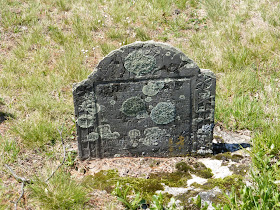HERE LYES THE BODY
OF JEAN HOLLAND
DAUGHTER TO STEPH^N
HOLLAND AND
JEAN HOLLAND DE-
PARTED THIS LIFE JANRY
10TH 1768 AGED 7 MONTHS
7 DAYS
Stephen Holland was born about 1733 in Coleraine, Northern
Ireland. He was a member of Roger’s
Rangers and was wounded at the battle of Fort William Henry and wounded again
at the battle of Quebec. He received a
pension for her service and wounds, and removed to Londonderry and lived on a
plot of land in East Derry across from the present day First Parish
Church. Colonel Holland opened a tavern
here.
He married Jane/Jean Stinson around 1751 and they had nine
children live to adulthood. Jane/Jean is
the only one buried in Derry (then known as Londonderry, New Hampshire).
In 1773 the town of Londonderry proclaimed allegiance to
Governor Wentworth, an appointed Royal Governor during the midst of pre Revolutionary
War unrest. Holland was suspected of being the author of this proclamation. When
the town of Londonderry called a town meeting to send delegates to the Exeter
Congress that same year, Holland, as Justice of the Peace, ordered the meeting
closed. Holland was a very unpopular man
while the rest of Londonderry’s inhabitants were patriots. Some suspected that
Holland was a British spy.
To save face Holland stood up at a town meeting in 1775 and
proclaimed his allegiance to the patriot cause.
The men at the meeting voted they were “satisfactory for his conduct”
and a month later they elected him as moderator in place of the usual
moderator, Matthew Thornton, who was at the Provincial Congress. On June 18, 1775 Holland secretly went to the
seacoast to recruit a militia of 200 men to assist the British. He even signed the Association Test in 1776,
which swore allegiance to George Washington.
He had fooled the town one more time!
Later, in 1778, he was found out and his property was
confiscated and sold by the Committee of Safety. On the same day the following other men were
banished, too: Richard Holland, John
Davidson, James Fulton, Thomas Smith, and Dennis O’Hala. There was a Captain Stephen Holland in the
Prince of Wale’s American Volunteers in 1782. His final burial place is unknown (and probably not in the Derry or Londonderry area!)
You can read more about Colonel Stephen Holland “Spy Master”
at this link to an article written by Richard Holmes, the Derry Town
Historian: http://www.londonderrynh.net/2014/08/stephen-holland-spy-master/75199
The recantation of Stephen Holland: http://amarch.lib.niu.edu/islandora/object/niu-amarch%3A83278
-----------------------------------------
Heather Wilkinson Rojo, "Tombstone Tuesday ~ Jean HOLLAND, died 1768 in Londonderry (now Derry), New Hampshire", Nutfield Genealogy, posted July 26, 2016, ( http://nutfieldgenealogy.blogspot.com/2016/07/tombstone-tuesday-jean-holland-died.html: accessed [access date]).



What a story... and what a sad beautiful little headstone here. Where did the rest of the Holland family move to? Those were such challenging times.
ReplyDeleteRichard [Holland, Stephen's son] and his family arrived at Conway, Nova Scotia (now St. John, New Brunswick) on July 15, 1783, on the vessel "Bridgewater" as Loyalist evacuees. When the Loyalists arrived they renamed Conway "Carleton" after Sir Guy Carleton, the Commander-in-Chief of British Forces at New York, who had so effectively organized Loyalists' safe passage as political refugees at the end of the American Revolution to British territory. [Source apparently errs in concluding that Richard was a son of Samuel Holland.]
ReplyDeleteSource: https://mediasvc.ancestry.ca/v2/image/namespaces/60623/media/a471741b-37a7-40a1-bf10-f7c3aaba1f4f.jpg?client=Boards